BestReviews is reader-supported and may earn an affiliate commission. Details
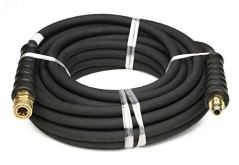
A dependable pressure washer hose that will come in handy for various clean-up tasks.
A dependable pressure washer hose that will come in handy for various clean-up tasks.
This wire-braided rubber pressure washer hose is likely to last you for years. At 50 feet in length and with a 3/8-inch diameter, this hose can support up to 4,000 psi.
The rubber and wire make this hose stiffer than some.
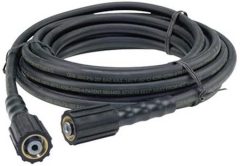
If you're looking for a shorter hose with a 1/4-inch diameter, this is a decent, affordable option.
If you're looking for a shorter hose with a 1/4-inch diameter, this is a decent, affordable option.
This is a straightforward hose from a trusted brand that works well. Rated for 3,000 PSI, this hose works with most gas pressure washers.
The protective coating is likely to wear away, which can result in leaks.
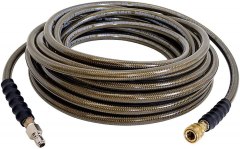
A reliable high-pressure hose that doesn't mark pavement or cement.
A reliable high-pressure hose that doesn't mark pavement or cement.
A pressure washer hose for gas pressure washers measuring 100 feet and 3/8 inches. Many customers reported using this hose for several years without issue.
The stiffness of this hose makes it difficult to coil.
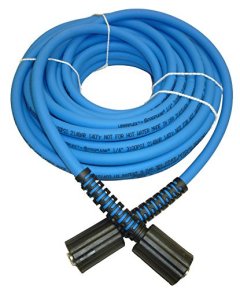
This is one of the less expensive 50-foot hoses available to cover a large area.
This is one of the less expensive 50-foot hoses available to cover a large area.
Supporting up to 3,100 psi, many customers prefer this hose over hoses included with most pressure washers. The flexibility of this hose makes it easy to coil.
Despite its kink-resistant claim, this hose is prone to kinking.

Extend your pressure washer's reach with this reliable 25-foot 2000 PSI high-pressure hose.
Extend your pressure washer's reach with this reliable 25-foot 2000 PSI high-pressure hose.
Works seamlessly with most pressure washers. Made from high-quality materials for long-lasting performance. Incredibly easy to install.
It is only backed by a 90-day warranty.

We recommend these products based on an intensive research process that's designed to cut through the noise and find the top products in this space. Guided by experts, we spend hours looking into the factors that matter, to bring you these selections.
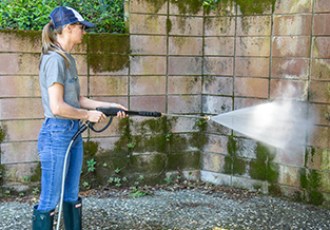
A pressure washer can turn the trickle from a simple hose into a powerful water jet that’s perfect for cleaning items outdoors. With a pressure washer in hand, you can remove dirt and grime from vinyl siding, wooden decks, and cement. With some pressure washers, you can add detergent for an even better clean.
The mechanics of a pressure washer are simple. Water enters the machine, which then expels that water at a high rate of pressure through the hose and attached sprayer. As you can imagine, a high-quality hose is important in order to successfully use the machine.
Should the hose that ships with your pressure washer be inadequate, you can purchase a replacement hose. The best pressure washer hoses have various diameters and lengths.

Hose diameter varies from product to product. The average pressure washer ships with a hose that 1/4 inch in diameter. However, a higher-quality pressure washer hose will have a diameter of 3/8 inch.
The diameter of the hose plays a role in the maximum amount of water pressure you can use. If you attempt to run too much water pressure through a hose with a small diameter, it could rupture. With a 1/4-inch diameter hose, you’ll max out at 2,000 to 3,000 psi of water pressure. With a 3/8-inch pressure washer hose, you can use a maximum of roughly 5,000 psi of water pressure.
If you go with a cheap pressure washer hose, you run the risk of it splitting under pressure. As the hose ages, it also may develop cracks that could lead to a rupture.
Often, an inexpensive pressure washer will ship with a cheaply made hose. However, you can upgrade the quality of the hose later by spending a bit more money on a replacement hose.
If you plan to store your pressure washer hose in an area that is subject to below-freezing temperatures, be aware that a low-quality hose could sustain damage in the freeze/thaw cycle. A hose with a better build quality can handle these temperature changes successfully.

Many consumers, when using a pressure washer, appreciate the simplicity of a quick-connect plug connector. However, there are some connectors that have threads like a garden hose. When choosing a replacement hose for your pressure washer, make sure the connector styles match. If they don’t, you may be able to purchase an adapter to change the type of connector the power washer uses. However, this is not guaranteed.
Pressure washer hoses are typically made of the same materials that garden hoses are. Often, this material is PVC plastic. It’s tough and inexpensive, but it doesn’t flex easily. For a type of hose that is easier to manipulate, select a rubber material. You may find polyurethane in pressure hoses, but it’s not as common as the other materials.
If you’re using an electric power washer, you may want a long hose. When pairing a long hose with a long extension cord, the power washer can be used almost anywhere. A short hose may not allow you to reach every location you want to wash. You can find replacement hoses in lengths between 20 and 200 feet.

Replacement pressure washer hoses are not expensive. By purchasing a replacement hose, you’ll give your pressure washer new life, extending the value of the machine.
Basic pressure washer hoses cost in the $10 to $20 range. These hoses consist of cheaper materials like PVC plastic, and they are usually limited to 25 feet in length. They are also limited to 2,000 or 2,500 psi of water pressure.
Mid-level hoses cost $20 to $40. They generally have lengths ranging from 25 to 50 feet, although you may be able to find the occasional 75-foot hose in this range. Pressure washer hoses in this price range may be made of rubber or PVC.
Expensive pressure washer hoses typically cost $40 to $75, although a few may cost $100 or more. These hoses measure anywhere from 50 to 200 feet in length. They are often made of a high-quality, heavy-duty material like rubber. These hoses should be able to handle psi measurements of 4,000 or 5,000.

A. No. You can purchase a replacement hose. Let’s say you want a hose with a larger diameter to generate more water pressure. A replacement hose can give you that plus extra length or a more durable material, too. Just make sure the replacement hose fits your current pressure washer connector.
A. After using the pressure washer, disconnect the hose and spray gun. Hang the hose, allowing it to drain and air dry. Most people don’t use a pressure washer regularly. This means leaving the hose connected for a few weeks could lead to corrosion from the leftover water. Or, if you have leftover water inside the hose and store it in a location where it will freeze, the hose could suffer damage.
A. A short length of hose works fine in most instances. It’s easier to dry after use than a longer hose. A shorter hose will not kink as easily as a longer hose, either, and it’ll give you more control over the spray wand.
A. If you select a hose that’s too long for the pressure washer, you’ll sacrifice water pressure. A longer hose needs a machine with the ability to generate a greater level of water pressure. A weaker machine won’t be able to maintain the water pressure through the entire length of an extra-long hose.
Get emails you’ll love.
Learn about the products you’re wondering if you should buy and get advice on using your latest purchases.
